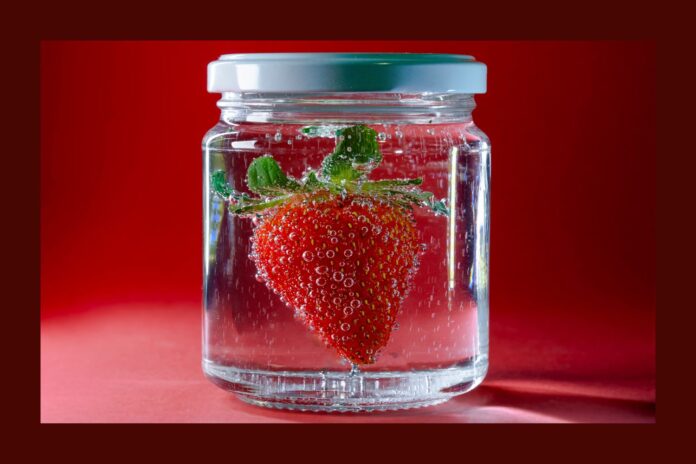:max_bytes(150000):strip_icc():format(jpeg)/Storing-Produce-in-Jars-Can-Lead-to-Dangerous-Bacterial-Growth-FT-BLOG1024-01-eb78ca7d087f47a4999017704f4f7d8f.jpg)
For most people, tossing produce into the fridge where it can’t clearly be seen skyrockets the odds that it will be forgotten. All that wasted produce and money has led many to pursue the fridgescaping trend, where fruits and vegetables that previously would have been relegated to a crisper drawer now serve as a pretty focal point in jars in the refrigerator.
But while those gorgeous designs raise the odds that produce will be eaten, food safety experts say they can also serve as a breeding ground for bacteria. But that doesn’t mean you can’t artfully arrange your produce in jars or other containers — you just need to be smart about it.
Here’s what three food safety experts recommend.
Why is storing produce in jars a cause for concern?
There are a few potential things to have on your radar here. “One of the main risks with this trend is storing produce in jars submerged in water, as this can lead to the growth of bacteria that can cause illness,” says food safety expert Ellen Shumaker, Ph.D., director of outreach for the Safe Plates program at North Carolina State University. “If there is even a small amount of bacterial contamination on a piece of produce, being submerged in water could allow this bacteria to multiply and grow to a much larger amount.”
Listeria monocytogenes, which can cause fever, muscle aches, and diarrhea, “grows well at refrigerated temperatures,” Shumaker points out. “This storage method can also allow for the growth of spoilage microorganisms that won’t make you sick but can make the food not something you want to eat,” she adds.
Ellen Shumaker, Ph.D.
A tightly sealed jar may create anaerobic conditions where Clostridium botulinum becomes a risk
— Ellen Shumaker, Ph.D.
Tightly sealing your jars is a potential issue, too, says Donald Schaffner, Ph.D., a microbial risk assessment and cross-contamination expert at Rutgers University. “A tightly sealed jar may create anaerobic conditions where Clostridium botulinum becomes a risk,” he says. Clostridium botulinum produces dangerous toxins and can lead to a life-threatening disease called botulism, per the United States Department of Agriculture (USDA).
“Also, a tightly sealed jar may lead to gas buildup either due to respiring produce or to microbial growth,” Schaffner says. “If enough pressure builds up, the jar might explode, leading to glass all over your fridge.”
Ultimately, fridgescaping “could lead to the spread of microorganisms from non-food items to not just produce, but any other type of food exposed,” says Francisco Diez-Gonzalez, Ph.D., professor and director of the Center for Food Safety at the University of Georgia.
Does it matter whether I use glass or plastic containers?
From a bacterial growth standpoint, not really. “It’s not so much the type of container as much as whether the produce is completely sealed inside or submerged in water, which you will want to avoid,” Shumaker says. “I would be cautious about storing any type of produce in a sealed container for long periods of time.”
That said, Diez-Gonzalez says it’s important to use food-grade containers over any container you happen to find around your place. “Some glass and ceramic materials may contain heavy metals or other substances that could contaminate the produce,” he says.
How can you tell if your produce is contaminated?
Your produce will typically contain some level of bacteria, Schaffner says. “Fortunately, most of the time these are only the bacteria that make food spoil and not the kind that make us sick,” he says.
Beyond that, it’s hard to tell if your fruits and vegetables are breeding potentially dangerous bacteria. “The contamination may not change the appearance or flavor of the produce,” Diez-Gonzalez says. However, spoilage bacteria may create some off flavors or scents you would notice, Shumaker says.
How to store your produce safely
In general, experts recommend against storing your produce in water or with a tightly sealed lid. But Schaffner says you’re OK to keep on fridgescaping, as long as you avoid those moves. “Obviously, you should wash your hands before handling food,” he says. “If you’re going to store it in jars, the jars should be washed and rinsed first.”
Shumaker also recommends making sure your fridge is at 41 degrees or below. “This helps reduce the likelihood of potentially harmful bacteria growing,” she says. And, if you know you won’t get to your produce within a decent time frame despite its pretty arrangement, Shumaker suggests freezing what you can to extend its use.



